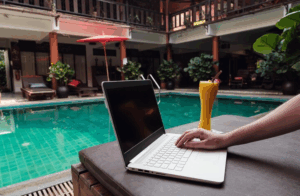As hotels, bars, restaurants, and other hospitality businesses work to create memorable experiences for their guests, AI is developing as the industry-altering technology that will shape hospitality digital marketing. Discover the newest AI powered solutions that are catalysing the revolution in the hospitality industry.
From personalised marketing opportunities to improved operations, AI will enable the hospitality industry to anticipate the needs of the guests, create worthwhile experiences, and fundamentally alter the hospitality marketing industry’s competitive landscape.
In this article, you’ll learn about how AI is changing hospitality digital marketing?. You’ll learn how to leverage AI technology and tools to create personalised visitor experiences, multi-channel marketing optimised, and improved operational practices. From chatbots to predictive analysis, you’ll learn about the new AI enabled tools in hospitality, and they can improve the hospitality marketing strategy.
Continue reading to unlock the potential benefits of AI in hospitality digital marketing:
The Industry’s Digital Marketing Landscape
- The global AI in Hospitality Market size was valued at USD 16.33 billion in 2023 and is projected to reach USD 70.32 billion by 2031, growing at a CAGR of 20.36% from 2024 to 2031.
- The exponential growth of big data is a significant driver fueling the adoption of AI technologies in the hospitality industry. With the proliferation of digital channels and connected devices, hotels are accumulating vast amounts of guest-related data, including preferences, behaviors, and booking patterns.
- The chatbots or travel bots segment is anticipated to witness the highest CAGR of 26.28% over the forecast period as a result of the increasing demand for contactless and personalized guest interactions in the hospitality industry.
- Hotel marketing efforts are shifting to digital channels as reports show that online bookings make up almost 60% of all hotel bookings. Half of those who book hotel rooms digitally do so from a mobile device, making mobile optimization an essential part of any hotel’s digital marketing strategy.
Personalisation and Guest Experience
AI empowers hotels to deliver personalized experiences, build connections and loyalty, and drive revenue growth. By analyzing booking patterns, social media engagement, and other data, hotels and restaurants can adjust their offers and services, create targeted email campaigns, and deploy intelligent chatbots.
- A lot of restaurants and hotels use apps to offer personalized recommendations and services to guests.
- AI-powered chatbots are utilized to facilitate hotel check-ins.
- Loyalty programs leverage AI to offer tailored rewards and benefits to guests.
- AI tools like SalesLoft and LivePerson help with customer interactions and services. They use deep learning models and can understand context, making the conversations much closer to human interaction.
- Moreover, AI-driven email solutions improve conversions significantly by predicting which emails will be opened based on derived engagement behavior. Tools like HubSpot AI and Seventh Sense are used for automating and personalizing email campaigns.

Content Creation and SEO Workflows
Content creation and SEO have significantly improved revenues for the hospitality industry in recent years. AI content generators are now used to create posts about events, offers, and other creative ideas to improve social media engagement and online visibility. A lot of AI-driven platforms even help hotels and restaurants identify relevant influencers and connect with them to reach new audiences.
Some important content marketing tools include:
- Copy AI: To generate high-quality, engaging content for your social media.
- Surfer SEO: Content optimization platform to optimize your content for first page rankings.
Operational Efficiency and Revenue Growth
AI boosts operational efficiency by forecasting demand, optimizing staffing, and adjusting energy management systems. By utilizing AI, the hospitality industry can streamline processes, reduce costs, and drive revenue growth. AI-powered systems create optimized staff schedules, minimizing overtime and reducing labor costs. These systems also automate procurement processes, ensuring timely and cost-effective ordering. When it comes to energy management and sustainability, AI-powered systems adjust lighting, heating, and cooling levels based on the time of the day and weather forecasts.
Examples of some AI tools used to enhance operational efficiency include:
- Task management tools: AI-powered task management tools help teams assign, track, and manage tasks across different departments.
- Voice activation assistance like aiOla: aiOla allows staff to use voice commands to quickly retrieve and relay information, such as reminders and task updates.
- HotelTime PMS: Helps with predictive maintenance and is part of the property management system.
- Optii: A housekeeping optimization tool.
- RateGain: RateGain’s tools offer ease of use, valuable market insights, and automation to reduce workload, contributing to operational efficiency and profitability.
Customer Insights and Predictive Analytics
By looking at historical data, predictive analytics can forecast customer behavior, occupancy rates, revenue trends, and visitor behavior. This knowledge makes it easier to make the right digital marketing decisions to drive growth. Customer insights and predictive analytics provide hotels and restaurants with a competitive advantage, enabling them to make data-driven decisions and stay ahead of the competition. It also helps identify the areas for improvement, allowing the businesses to create better-tailored offers that enhance guest loyalty.
Example: Marriott Bonvoy (Loyalty Program)
Marriott International uses predictive analytics and customer insights to personalize its loyalty program and enhance guest experiences. Guests who frequently stay at Marriott receive offers for free Wi-Fi and breakfast. Similarly, guests who frequently prefer luxury accommodations receive offers for upgraded suites and rooms.
Example: Pizza Hut
Pizza Hut, the global food chain, also uses predictive analytics to provide personalized offers to its customers. Those who frequently order their pizza may receive BOGO deals.
The following AI tools are used by marketers to see customer needs before they even arise, thus launching marketing strategies accordingly to engage and retain customers.
- IBM Watson Marketing: Machine learning-based customer behavior prediction.
- Google Analytics 4 (GA4): AI-based user insights and forecasts.
Enhanced Safety and Security Systems
AI can provide safety and security systems in the hospitality industry. Utilizing predictive analytics and analyzing historical data can help identify potential security risks. AI-powered monitoring systems can analyze CCTV footage, sensor data, and other sources to detect suspicious activity and alert the relevant security personnel. There are AI-powered identity verification systems as well, which can analyze guest data to prevent theft and ensure secure check-in processes.
Similarly, the intrusion detection and cybersecurity systems can also protect the hotel and restaurant systems from cyber threats or break-ins. Secure payment processing systems can protect customer payment information and prevent fraudulent transactions. These tools can then be highlighted in marketing initiatives as they may appeal to customers due to increased safety and security.
- Tools like Cylance, Darktrace, Vectra, Deep Instinct, and NB Defense are some of the best security AI tools.

Social Media and Reputation Management
AI has significantly transformed the world of social media. The AI tools track the engagement, suggest content, and schedule posts to gain maximum engagement. Through sentiment analysis, AI tools can analyze social media content to determine the sentiment of customers, helping businesses identify areas of improvement. AI-powered tools have also made it easier to manage during a crisis. They allow hotels and restaurants to respond quickly and effectively to online crises, such as negative reviews or social media backlash.
Through AI-powered social media management, the hospitality industry can build a more positive online reputation with increased customer loyalty and retention.
Some famous AI tools used for social media include:
- Hootsuite Insights: It analyzes trends and monitors preferences on social media.
- Lately AI– A social content creation platform merging human creativity, AI, and technology for unmatched performance in digital marketing.
- Brandwatch– It focuses on market research, consumer research, social media analytics, social media monitoring, and social media management.
Conclusion
As we have explored the transformative power of AI in hospitality digital marketing, one thing is clear: the future of hospitality is here, and it is driven by data, personalised experiences, and cutting-edge technology. The hospitality industry is constantly evolving, but one thing remains constant: the need for excellent guest experiences. By harnessing the power of AI, hotels, restaurants, and bars can create unforgettable moments, build lasting relationships, and achieve long-term success.
At CJ Digital, we are passionate about helping the hospitality industry unlock the potential of AI-powered marketing. Our team of professionals and experts is dedicated to delivering innovative solutions to perfectly optimise your digital marketing campaigns.
So why wait? If you are a hospitality business owner, join the AI revolution and discover limitless possibilities to drive real results!
FAQs
1- What AI-powered tools are used in hospitality digital marketing?
AI-powered tools used in hospitality digital marketing include chatbots, predictive analytics, content generation tools, CRM systems, and customer segmentation platforms.
2- How does AI optimise marketing efforts in hospitality?
AI optimises marketing efforts in hospitality by analysing guest behaviour and preferences, identifying trends, and automating marketing campaigns.
3- Can AI improve operational efficiency in hospitality?
Of course! By automating tasks, streamlining processes, utilising chatbots, and predicting and preventing operational issues, AI can significantly improve operational efficiency in the hospitality industry.
4- What is predictive analytics, and how is it used?
Predictive analytics in hospitality digital marketing uses AI, machine learning algorithms, and past data to predict future behaviour, analyse customer behaviour, identify potential operational disruptions and optimise operations to improve decision making and seize opportunities.
5- Can AI help hotels and restaurants increase revenue?
By optimising pricing, improving occupancy rates, and offering personalised services and experiences, AI has been helping the hospitality industry boost sales and generate better revenue!
